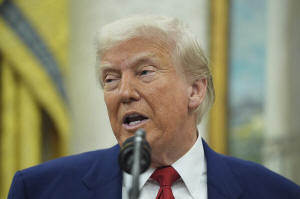What happens to Trump’s tariffs now that a court has knocked them down?
[May 29, 2025]
By PAUL WISEMAN
WASHINGTON (AP) — A federal court in New York handed President Donald
Trump a big setback Wednesday, blocking his audacious plan to impose
massive taxes on imports from almost every country in the world.
A three-judge panel of the U.S. Court of International Trade ruled that
Trump overstepped his authority when he invoked the 1977 International
Emergency Economic Powers Act to declare a national emergency and
justify the sweeping tariffs.
The tariffs overturned decades of U.S. trade policy, disrupted global
commerce, rattled financial markets and raised the risk of higher prices
and recession in the United States and around the world.
The U.S. Court of International Trade has jurisdiction over civil cases
involving trade. Its decisions can be appealed to the U.S. Court of
Appeals for the Federal Circuit in Washington and ultimately to the
Supreme Court, where the legal challenges to Trump’ tariffs are widely
expected to end up.
Which tariffs did the court block?
The court’s decision blocks the tariffs Trump slapped last month on
almost all U.S. trading partners and levies he imposed before that on
China, Mexico and Canada.
On April 2, Trump imposed so-called reciprocal tariffs of up to 50% on
countries with which the United States runs a trade deficit and 10%
baseline tariffs on almost everybody else. He later suspended the
reciprocal tariffs for 90 days to give countries time to agree to reduce
barriers to U.S. exports. But he kept the baseline tariffs in place.
Claiming extraordinary power to act without congressional approval, he
justified the taxes under IEEPA by declaring the United States'
longstanding trade deficits “a national emergency.”
In February, he'd invoked the law to impose tariffs on Canada, Mexico
and China, saying that the illegal flow of immigrants and drugs across
the U.S. border amounted to a national emergency and that the three
countries needed to do more to stop it.

The U.S. Constitution gives Congress the power to set taxes, including
tariffs. But lawmakers have gradually let presidents assume more power
over tariffs — and Trump has made the most of it.
The tariffs are being challenged in at least seven lawsuits. In the
ruling Wednesday, the trade court combined two of the cases — one
brought by five small businesses and another by 12 U.S. states.
The ruling does leave in place other Trump tariffs, including those on
foreign steel, aluminum and autos. But those levies were invoked under a
different law that required a Commerce Department investigation and
could not be imposed at the president’s own discretion.
[to top of second column]
|

President Donald Trump speaks during a swearing in ceremony for
interim U.S. Attorney General for the District of Columbia Jeanine
Pirro, Wednesday, May 28, 2025, in Washington. (AP Photo/Evan Vucci)

Why did the court rule against the president?
The administration had argued that courts had approved
then-President Richard Nixon’s emergency use of tariffs in a 1971
economic and financial crisis that arose when the United States
suddenly devalued the dollar by ending a policy that linked the U.S.
currency to the price of gold. The Nixon administration successfully
cited its authority under the 1917 Trading With Enemy Act, which
preceded and supplied some of the legal language later used in
IEPPA.
The court disagreed, deciding that Trump’s sweeping tariffs exceeded
his authority to regulate imports under IEEPA. It also said the
tariffs did nothing to deal with problems they were supposed to
address. In their case, the states noted that America's trade
deficits hardly amount of a sudden emergency. The United States has
racked them up for 49 straight years in good times and bad.
So where does this leave Trump's trade agenda?
Wendy Cutler, a former U.S. trade official who is now vice president
at the Asia Society Policy Institute, says the court's decision
"throws the president’s trade policy into turmoil.”
“Partners negotiating hard during the 90-day day tariff pause period
may be tempted to hold off making further concessions to the U.S.
until there is more legal clarity," she said.
Likewise, companies will have to reassess the way they run their
supply chains, perhaps speeding up shipments to the United States to
offset the risk that the tariffs will be reinstated on appeal.
The trade court noted that Trump retains more limited power to
impose tariffs to address trade deficits under another statute, the
Trade Act of 1974. But that law restricts tariffs to 15% and only
for 150 days with countries with which the United States runs big
trade deficits.
For now, the trade court's ruling “destroys the Trump
administration’s rationale for using federal emergency powers to
impose tariffs, which oversteps congressional authority and
contravenes any notion of due process,” said Eswar Prasad, professor
of trade policy at Cornell University. "The ruling makes it clear
that the broad tariffs imposed unilaterally by Trump represent an
overreach of executive power.''
_____
AP Writer Lindsay Whitehurst contributed to this story.
All contents © copyright 2025 Associated Press. All rights reserved |